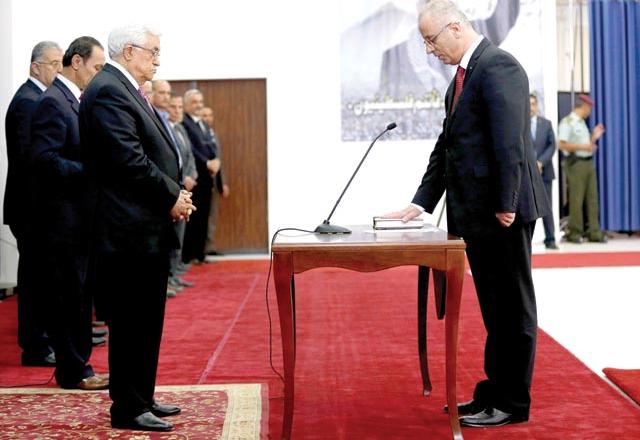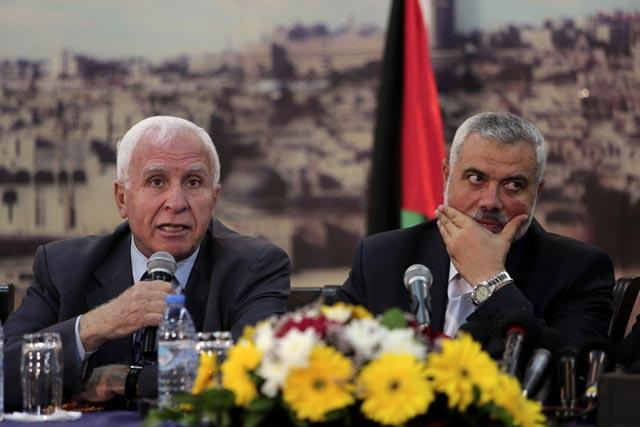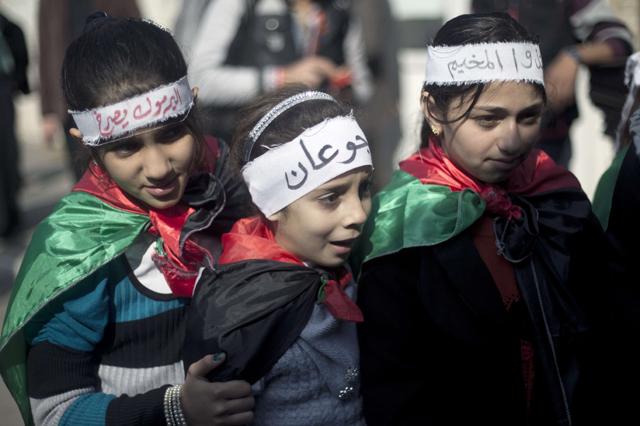You are here
Abbas swears in Palestinian unity gov’t shunned by Israel
Jun 02,2014 - Last updated at Jun 02,2014

RAMALLAH — President Mahmoud Abbas swore in a Palestinian unity government on Monday in a reconciliation deal with Hamas Islamists that led Israel to freeze US-brokered peace talks.
Abbas, whose Palestinian Authority in the Israeli-occupied West Bank is dependent on foreign aid, appeared to be banking on Western acceptance — over Israeli objections — of a 16-member Cabinet of what he described as politically unaffiliated technocrats.
Setting a policy in line with US and European Union demands, the Western-backed leader said his administration would continue to honour agreements and principles at the foundation of a peace process with Israel.
Hamas, which advocates Israel’s destruction, has run the Gaza Strip since seizing the territory from Abbas’ Fateh forces in a brief civil war in 2007.
Numerous reconciliation efforts, largely brokered by Egypt, have failed over power sharing.
“Today, and after announcing the government of national unity, we declare the end of division that caused catastrophic harm to our cause,” Abbas said, voicing sentiments widely shared by Palestinians, as ministers took the oath of office in a ceremony in the West Bank city of Ramallah.
Prime Minister Benjamin Netanyahu’s security Cabinet responded with a threat to hold Abbas and the new government accountable for any attacks against Israel, alluding to sporadic rocket fire from Gaza to which Israel has thus far responded by bombing militant strongholds in the coastal territory.
“The agreement with Hamas makes Abbas directly responsible for any terrorist activity from Gaza,” Netanyahu said in a statement summing up the ministers’ meeting.
Netanyahu urged world leaders on Sunday not to rush into recognising the Palestinian unity government, and Israel barred three Gaza-based ministers from travelling to the West Bank to be sworn in.
Ismail Haniyeh, the outgoing Palestinian prime minister in Gaza, said in a speech in the enclave that it was “a historical day” that closed a “chapter of seven years of division”.
Hamas television referred to Haniyeh as a “former prime minister”, in deference to the current West Bank-based holder of the post, Rami Al Hamdallah.
But in his address, Haniyeh spoke of pursuing “resistance by all forms”, an apparent reference to actions that include armed conflict with Israel, and he said the unity deal meant that Hamas’ militia, the Qassam Brigades, “became an army today”.
Israeli sanctions?
In the absence of Fateh forces in Gaza, Hamas will effectively retain its security grip in the territory, where in addition to the 25,000-member Qassam Brigades, the Islamist group also controls 20,000 other armed personnel.
Netanyahu’s security Cabinet, meeting in special session, vowed to hold the new government responsible “for all operations that inflict harm against Israeli security” launched from either the West Bank or Gaza.
Israel also reaffirmed its decision of a month ago to eschew diplomatic negotiations with any Palestinian government that includes Hamas, which Israel rejects as a terrorist group. Israel also vowed to seek international help to bar Hamas from participating in a coming Palestinian election.
The Israeli statement made no mention of possible economic measures though it empowered Netanyahu to impose further sanctions on the Palestinian Authority.
Israel withheld some tax revenues from the Palestinians in retaliation for Abbas’ signing in April of international conventions and treaties after Netanyahu reneged on a promised release of Palestinian prisoners.
The peace talks, which began in July, had been stalled, with divisions deep over Israeli settlement building in occupied land Palestinians seek for a state and Israel’s demand that Palestinians recognise it as a Jewish state.
On Sunday, US Secretary of State John Kerry, who spearheaded the peace efforts that Israel froze when the unity deal was signed on April 23, spoke by telephone with Abbas and voiced his concern about Hamas’ role in the government, State Department spokeswoman Jen Psaki said.
“[Kerry] stated that the United States would monitor the situation closely and judge any government based on its composition, policies and actions,” Psaki said.
Israel, the United States and the European Union regard Hamas as a terrorist group.
Abbas has been keen to assure Western donor countries he will remain the key Palestinian decision maker and that security coordination between his forces and Israel will continue.
Both Fateh and Hamas see benefits to a unity pact.
With a strict blockade imposed by neighbours Israel and Egypt, Hamas has been struggling to prop up Gaza’s economy and pay its 40,000 employees. Abbas wants to shore up his domestic support since the peace talks with Israel collapsed.
Related Articles
A senior official from Palestinian party Fateh arrived in the Hamas-run Gaza Strip on Tuesday, ahead of reconciliation talks aimed at forming a unity government between the bitter rivals.
Israel cancelled a peace meeting with the Palestinians it said was scheduled for Wednesday after the Palestine Liberation Organisation (PLO) and Hamas pledged to form a joint government, an aide to the premier said.
Hamas Prime Minister Ismail Haniyeh reached out to West Bank rivals Fateh on Monday, saying its members would be allowed back into Gaza, in efforts to promote Palestinian reconciliation.

















